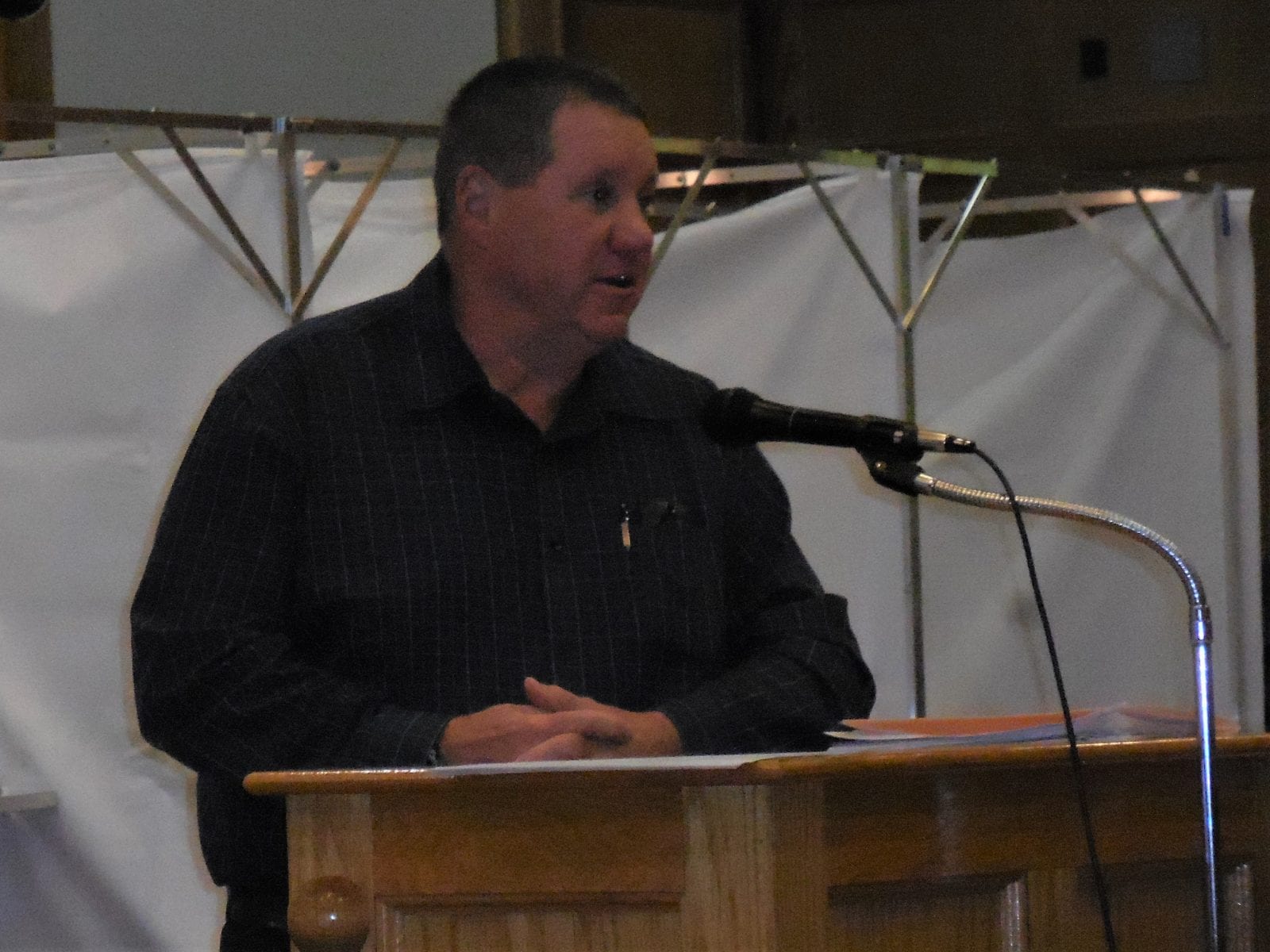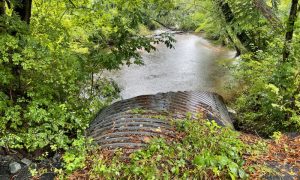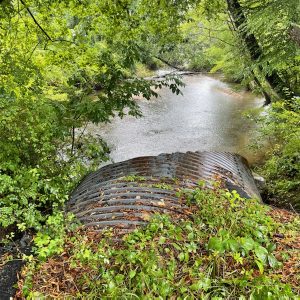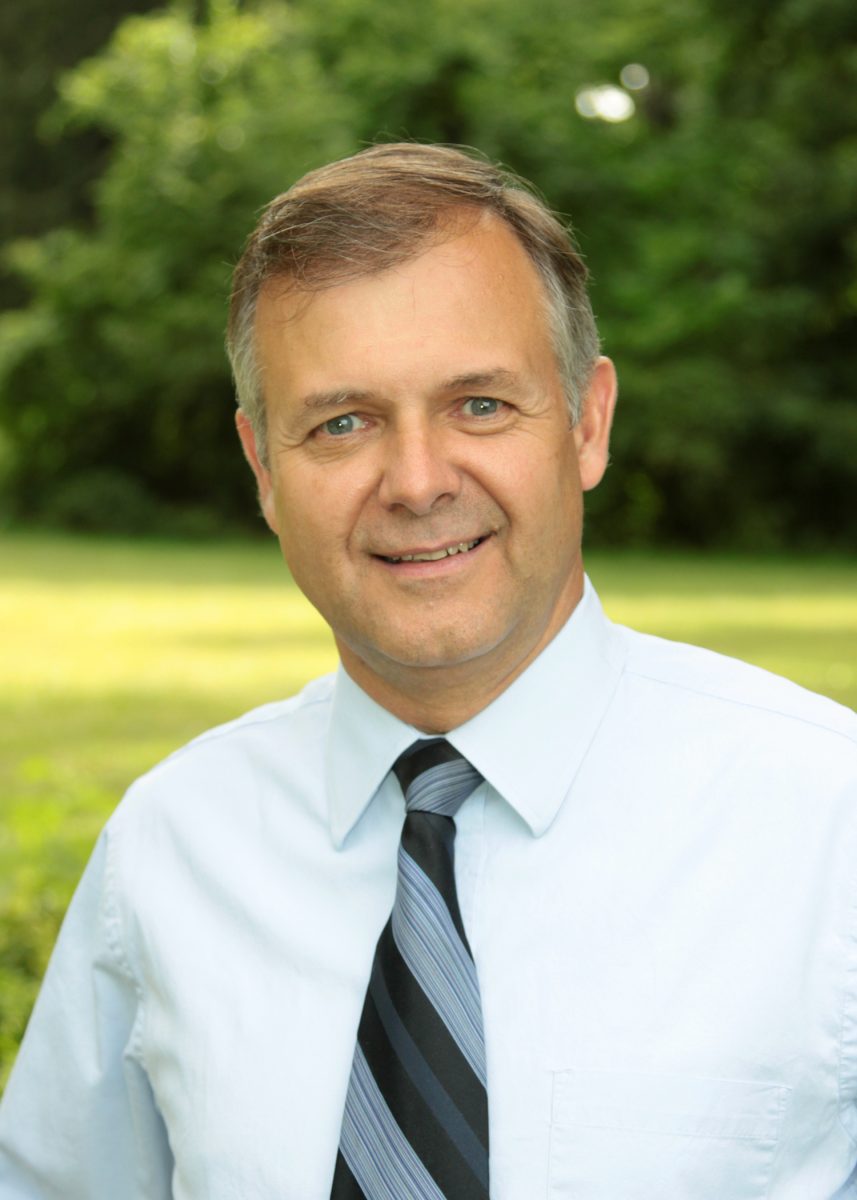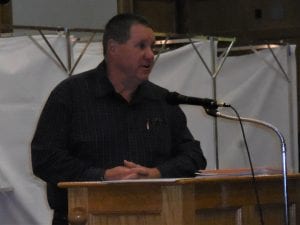
DPW Director David Billips addresses joint sub-committee on storm water fees.
WESTFIELD – A joint meeting of the Finance and Legislative & Ordinance sub-committees was held on Thursday following the Special City Council meeting to consider a motion by Ward 5 Councilor Robert A. Paul, Sr. and Ward 4 Councilor Michael Burns to analyze the present storm water fee and to identify gaps and work needed to be compliant with federal and state laws.
DPW Director David Billips gave a presentation on the current status of storm water in the city. He said new M54 general permit guidelines were reissued in 2016, and became effective on July 1, 2018, requiring compliance with the Federal Clean Water Act. Billips said storm water runoff is listed as the leading source of pollution to the water supply, according to the Environmental Protection Agency.
Billips said there are new federal and state mandates to manage storm water runoff, all of them unfunded.
Paul said what comes out of storm water drains needs to get emptied out and trucked off, and there are 8,000 catch basins to clean out. Billips said mandates require street sweepers and catch basin cleanout, illicit discharge control and erosion control. He said there are erosion problems on the Columbia Greenway Rail Trail, which Westfield Gas + Electric is partnering with the city to help resolve.
Billips said currently the cost of storm water maintenance in Westfield annually is $586,000, and the storm water fees presently generate $550,000. He said drainage related capital improvement needs total $3.46 million.
Paul said the work that was done on Granville Road and North Road ends as a patch, because the city didn’t have the money to redo the storm water systems. Billips said they did do drainage work on both roads, but the estimate for storm water work just on North Road alone was $1 million; and the road cost less than $800,000 to redo.
“We’ve done a lot of major road projects this year. I’m confident they’ll last a long time, but not as long as they should,” Billips said, adding, “We’re here to discuss what we’re mandated to do, and what we need to do. We did a large amount of storm water on both roads.”
Ward 3 Councilor Andrew K. Surprise asked whether there are areas of the city that don’t have the same problems as neighboring cities, such as Holyoke, because Westfield separated storm water and sewage lines 100 years ago.
“Our sewer system is fine. We’re ahead of the game because we don’t have to separate it from sewer,” Billips said. He said Chicopee just spent $200 million on their systems.
Billips proposed several pro-rated fee structures for commercial and residential spaces, based on the amount of impervious surface. Right now, he said the city has a flat fee for all of $5 a quarter, and $20 a year for storm water.
“If you take that average, people with 1,000 square feet pay the same as 3,000 square feet,” Billips said.
Billips said with the new rate structure just for residential at $54.36 annually, the city would raise an additional $367,000 a year. Presently, the city raises $200,000 a year from the residential fee. “This is based on an average for a flat fee,” Billips said. He said if the residential fees were based on impervious surface, the increase for the city would be $336,000.
Billips said for commercial properties, the city raises on average $238,000. A pro-rated structure based on impervious coverage would raise an additional $404,000 per year. He said with a new rate structure, the city would raise more than $700,000 additional for storm water repair.
“Is it your intention to use this income to pay down a bond,” asked Finance committee chair Dan Allie.
“We would look at the projects. The ones that have to be done right away, we would bond,” Billips said.
Paul said their proposal would be to support a $20 million bond earmarked for storm water projects that the city has to do, and for the equipment needed. He said $700,000 could support $4 million a year on a $20 million bond.
“People want to know which projects, and hold us accountable for this,” Allie said.
“If you look at what we’ve done the last year and a half, it’s more than we’ve ever done,” Billips said. He said the Council and Mayor gave DPW $400,000 in their construction account, added to $1.2 million in Chapter 90 and Meals Tax income, which allowed the work. “They hold us all accountable for this,” Billips said, adding that some of the storm water work that needs to be done people won’t see, because of where it is located.
Surprise asked whether money from storm water fees was being used for other road projects. “We have not used any storm water money where there wasn’t a storm water issue,” Billips said. He said $200,000 was spent on storm water issues on Granville Road. “We ripped up that road pretty good,” he added.
“I would like to look at the legalities on what it can be spent on,” Surprise said.
“We don’t have enough money now to do what we’re supposed to do,” Billips responded.
Paul said the matter will be going back to the Finance Committee. He said a fee increase is needed to support a capital improvement program. “There are a couple of gaps in the maintenance we’re doing,” Paul said, giving the example of Wards 2 and 3 which have the oldest infrastructure in the city, and have experienced some collapse. He said they need the $20 million bond at $4 million annual increments to address the issues.
“A city this size, we (DPW) should have $5 million a year. We have $2 million a year,” Billips said.
After further discussion of capital needs, At-large Councilor Nicholas J. Morganelli, Jr. commented that all of the numbers and costs need to be broken down and accounted for. “The City Council has constituents we need to answer to. What is the DPW going to do for public outreach and education,” Morganelli asked. He said back in 2011 in his previous term on the council, he reluctantly voted to add a storm water fee, because it was mandated. “We voted for the minimum,” he said, adding, “We shouldn’t have the responsibility of giving them (the people) all the answers.”
“This is what we asked for the last time. We got a quarter of what we asked for, and we’re paying for it,” Billips said.
Resident Jim Parker of Honeypot Road, who was present at the sub-committee meeting, was permitted to comment on the plan. “You’re raising my road taxes, and I can’t take it off my income tax,” he said, adding that there are over 120 miles of storm water pipe that needs to be addressed.
Paul asked Billips to come back with a number and a list of things to address. He said the council needs his expert opinion on the process to follow, the order in which to do things to meet federal and state guidelines, and a public hearing to explain it. “I like the communication,” Paul said, adding that the great thing that came out of the water debate was visibility.
Billips said he could do a capital plan, although the last time he did one he came up with $30 million, and had $1.6 million to address it.
Surprise made a motion to refer the plan to the Finance Committee. Paul said with all of the detail and work that has already been done, he asked for the Finance Committee to consider the pro forma increase Billips recommended.
Billips agreed to put together a capital plan to show what the fees would be used for. He said the capital plan would include bond payments.
“The urgency is by January 1 to begin any increase in order to cover expenses and create income,” Paul said.

